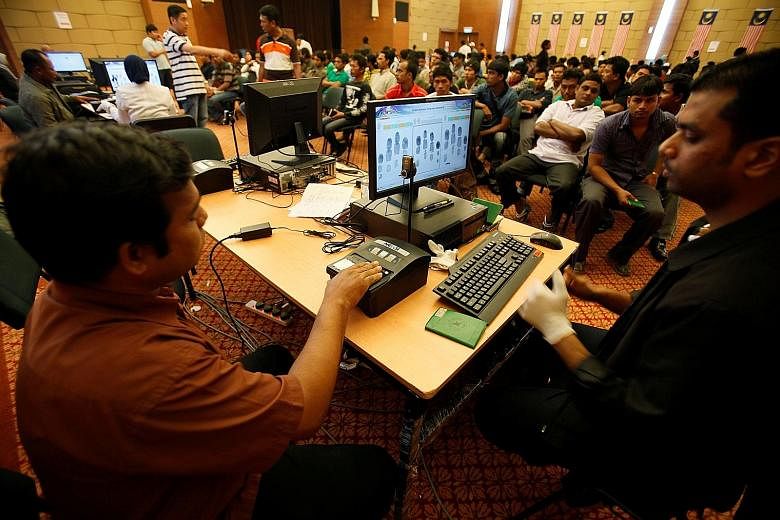Malaysia has reintroduced an amnesty scheme to get millions of illegal foreign workers in the country to voluntarily leave, but critics say the move does not tackle the root causes of the problem.
The estimated number of undocumented migrant workers in Malaysia range from 3.9 million to 5.5 million, more than double its 1.76 million legal foreign workers. The government has set a target to reduce the total number of foreign workers to just over two million, or 15 per cent of the workforce, by next year.
Under the amnesty programme, which runs from Aug 1 to the end of the year, illegal workers can leave the country without being prosecuted after paying a RM700 (S$230) fine and the fare back to their home country. Most of the foreign labour in Malaysia come from Indonesia, Bangladesh, Nepal and Myanmar.
The last time the programme ran from July 2014 to August last year, the government collected RM400 million in fines from over 840,000 workers who came clean and returned home. But instead of reducing their numbers, the illegal worker headcount, estimated at 1.6 million in 2016, has soared since.
"It's a cosmetic solution to the problem," said Adrian Pereira, founder of social justice NGO, North South Initiative.
"As long as there's no comprehensive labour policy on migrant management, we are not solving the root causes for abuses."
Activists and rights groups have long argued that migrant workers often find themselves without proper documentation because they are exploited under a flawed recruitment system, or by unscrupulous employers who withhold their passports or do not renew their work permits.
Often, workers are trapped in debt bondage after paying exorbitant fees charged by hiring agents.
Malaysia has for decades relied heavily on cheaper migrant workers taking on so-called "3D" jobs - tasks that are dirty, dangerous and demeaning - in sectors like construction, manufacturing and plantations, to fuel its economic expansion. But, it needs to implement a coherent policy for managing them, activists said.
"We need these workers. Like it or not, the country's economy doesn't function without migrant labour," said Datuk Noor Farida Ariffin, a member of the Special Committee on Foreign Worker Management formed in August last year by the government.
"I agree with the amnesty programme, but I also support workers whose permits have expired to be rehired because so many sectors need workers."
She added that both amnesty and rehiring programmes should be rolled out concurrently to give workers a choice to either leave or stay. She said that this was part of the committee's proposal on migrant workers yet to be approved by the government.
"Why is the government looking to send these workers back and then bring in fresh newcomers to work? It is a waste of money and makes no sense," she told The Straits Times.
Instead of targeting undocumented workers, the government should focus on employers, say rights groups.
Under Malaysian law, an employer who hires illegal workers can be fined up to RM50,000 for each worker, imprisoned for five years, or both. The reality, though, is that it is the workers who are more likely to be penalised.
"Employers are not targeted because they know their rights, but migrant workers don't," said Ms Noor Farida.
The Immigration Department told The Straits Times that its approach to dealing with undocumented workers is based on a master plan from the Home Ministry, which includes enforcement operations and border control.

